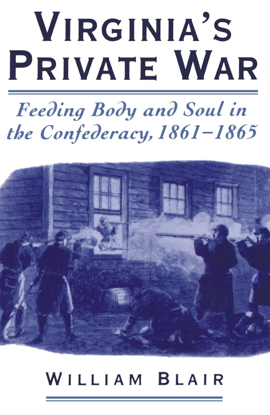Virginia's Private War by William Blair
 I re-read one of my favorite books this week: William Blair's Virginia's Private War: Feeding Body and Soul in the Confederacy, 1861-1865. Let me tell you why I really really love this book.
There is a school of thought in Civil War scholarship that suggests the Confederates did themselves in...that dissension at home and in the ranks meant that Confederate soldiers as well as the the white southern populace were never that on board with Confederate nationalism. The second things got a little rough for the southern cause people abandoned it wholesale.
I re-read one of my favorite books this week: William Blair's Virginia's Private War: Feeding Body and Soul in the Confederacy, 1861-1865. Let me tell you why I really really love this book.
There is a school of thought in Civil War scholarship that suggests the Confederates did themselves in...that dissension at home and in the ranks meant that Confederate soldiers as well as the the white southern populace were never that on board with Confederate nationalism. The second things got a little rough for the southern cause people abandoned it wholesale.
Naturally , I think this is a load of malarkey. Rebels stuck it out as long as they possibly could - both on and behind the lines. They were - for the most part - completely in tune with the notion of Confederate independence...despite the hardships that they had to endure.
William Blair drives this point home. His book - a wonderful piece of scholarship that I would recommend to anyone - suggests that Confederates - actually in this case, Virginians - did not lose the war because of failed nationalism or internal conflicts.
Neither of these things work as a simple explanation for Confederate defeat – dissent existed and functioned as a catalyst for change in the Confederacy. And here's the real zinger - Confederates still supported the cause even though they often lost faith in the government. Their “sense of purpose” remained strong until finally in the winter 0f 64-65 the Union army took its toll.
The point - it was wartime. Yes people were pissed because of shortages, conscription, and all of the other things that can just make a wartime society mad - but did they want to abandon the Confederate experiment, or did they just want a fair shake? That, I suppose is the key. You can still support your cause even if you think it is being run poorly.
Virginia's Private War focuses on three counties: Albemarle (Charlottesville), Augusta (Staunton) and Campbell (Lynchburg). These counties contained a range of plantation (slave) and grain farming - representing a wide spectrum of Virginian Confederates. Plus, C’ville was an intellectual center, which means they were doing a lot of thinking about important issues in the vicinity of the University of Virginia (OK, Bill….lets not get carried away).
In the end, Blair credits the Union Army with victory...something that has been curiously overlooked by scholars seeking the ways the Confederates defeated themselves. As it turns out...the Rebs were defeated on the battlefield. Imagine that. Remember, even the storied Confederate George Pickett once said of defeat..."I think the Union Army had something to do with it."
With compliments,
Keith